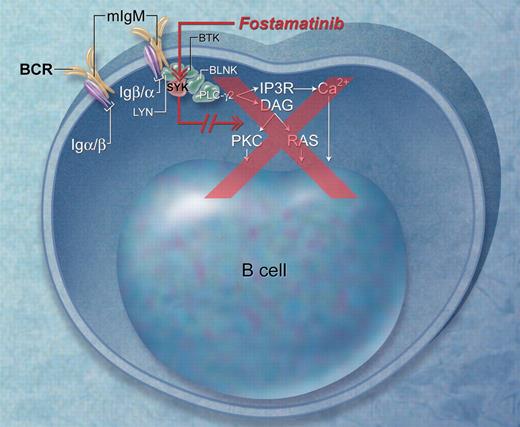In this issue of Blood, Friedberg and coworkers present the first report of fostamatinib disodium, a Syk inhibitor, as an active treatment for patients with B-cell non-Hodgkin lymphomas and chronic lymphocytic leukemia.1
After decades of chemotherapeutic ennui, comparing various drug acronyms, treatment for patients with B-cell malignancies became relatively exciting with the availability of active and well-tolerated monoclonal antibodies, notably the anti-CD20 rituximab. Finally, survival was prolonged in patients with diffuse large B-cell lymphoma (DLBCL), follicular lymphoma, and chronic lymphocytic leukemia/small lymphocytic lymphoma (CLL/SLL). Nevertheless, 30% to 40% of patients with DLBCL still die from their disease, and the indolent and mantle cell lymphomas and CLL remain incurable. Moreover, the nonspecific chemotherapies with which the antibody was combined induce significant toxicities.
Pathways activated through the BCR that are amplified by Syk and lead to the survival of malignant B cells can be inhibited by fostamatinib. Professional illustration by A. Y. Chen.
Pathways activated through the BCR that are amplified by Syk and lead to the survival of malignant B cells can be inhibited by fostamatinib. Professional illustration by A. Y. Chen.
A greater understanding of the biology and genetics of these tumors has resulted in an almost exponential increase in the number of targeted therapies. These range from numerous monoclonal antibodies, to others capable of activating or inhibiting intracellular pathways, including AKT-mTOR, PI3-kinase, the intrinsic and extrinsic apoptotic pathways, and numerous others. Even beyond targeting the malignant cell has been the recent recognition of the importance of the tumor microenvironment.
The current study focuses on a drug that targets a pathway activated by the B-cell receptor (BCR). BCR signaling is important during B-cell ontogenesis and is key to the survival of malignant B cells. The survival of most B-cell lymphomas, most notably DLBCL, may depend on the non–ligand-dependent (“tonic”) signals from the BCR. These effects are amplified by spleen tyrosine kinase (Syk), a cytoplasmic tyrosine kinase that is important in mediating immunoreceptor signaling in B cells, as well as macrophages, neutrophils, and mast cells. The downstream events are regulated by a balance between the protein tyrosine kinase Syk activation and protein tyrosine phosphatase–mediated inhibition of Syk. In vitro inhibition of Syk induces apoptosis of a number of lymphoma cell lines. Considering the importance of BCR in B-cell survival in normal B cells and lymphoma cells, Syk appears to be a reasonable therapeutic target.2
Fostamatinib disodium is an oral prodrug that is rapidly converted to R406, a potent inhibitor of Syk. In rheumatoid arthritis, Syk expression has been detected in the synovial tissue. Syk also associates with the FcgammaR in macrophages and other inflammatory cells, thought to be responsible for clearance of platelets in idiopathic thrombocytopenic purpura. In both of these disorders, fostamatinib has demonstrated clinical efficacy with excellent tolerability.
In the current phase 1/2 study,1 fostamatinib was well tolerated; the most serious adverse effects included myelosuppression, fatigue, and diarrhea, which were rarely severe. The study patients had received a median of 4 previous therapies. Nonetheless, responses occurred in one-quarter of patients, with responses being more common in patients with CLL/SLL (54.5%) and DLBCL (23.5%), and less common in follicular lymphoma (9.5%) or mantle cell lymphoma (11.1%). Evidence of clinical activity was also noted in a number of other patients, although it was insufficient to qualify for a response. The median progression-free survival was 4.1 months for all patients.
Other than CLL/SLL, the response rates with fostamatinib were modest. However, single-agent activity is not essential for pursuing a novel targeted agent. The role of such drugs may primarily be to enhance the efficacy of other agents. Perhaps the poster child for this effect is bevacizumab (Avastin; Genentech Biooncology). Recent data suggest that, at least in CLL, the combination of R406 with fludarabine increases cytotoxicity compared with fludarabine alone. Moreover, in B-CLL cells, the cytotoxic effects of Syk correlates with Syk expression.3
B-cell diseases are markedly heterogeneous, even within histologic subtypes, as has been repeatedly demonstrated by gene-expression profiling and other technologies.4 Thus, differences in response may reflect variability in the inherent biology of a specific tumor. The goal is to individualize lymphoma therapeutic strategies based on molecular/genetic features of the tumor and pharmacogenomic characteristics of the patient. Therefore, it is critical to include correlative studies within clinical trials to demonstrate whether the relevant target is actually affected. Future strategies based less on nonspecific cytotoxics and more on combinations of targeted therapies directed at different receptors and pathways will bring us closer to limiting untoward effects while enhancing efficacy, resulting in cure of patients with B-cell malignancies.
Conflict-of-interest disclosure: The author declares no competing financial interests. ■


This feature is available to Subscribers Only
Sign In or Create an Account Close Modal